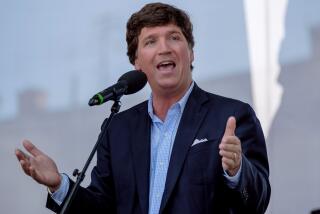John Chancellor, Venerable TV Newsman, Dies at 68
- Share via
John Chancellor, the venerated stalwart of NBC television news for 43 years who intoned the world’s daily happenings from an anchor chair, then moved on to analyze and interpret events as the last network commentator, died Friday. He was 68.
Chancellor, who had been ill with stomach cancer, died at his home in Princeton, N. J.
“He was unique,” former CBS News anchorman Walter Cronkite told CNN Friday night. “He was a major contributor to making the conversion from print to television, making television as important as it’s been as a medium for our time.”
“No one could earn your respect quite like John Chancellor,” wrote Times television columnist Howard Rosenberg when Chancellor retired three years ago. “His style was quietly professorial, not pretentious. He never preached or lectured. He never pretended to be divinely anointed with answers. He was a messenger who never posed as a messiah.”
His most memorable television appearance came when he was covering the San Francisco Republican National Convention that nominated Barry M. Goldwater in 1964. Chancellor was arrested for blocking an aisle during an interview.
The camera kept rolling and Chancellor kept talking: “Here we go down the middle aisle. It’s hard to be dignified at a time like this. . . . I’ve been promised bail, ladies and gentlemen, by my office. . . . I’ll check in later. This is John Chancellor, somewhere in custody.”
The only child of a Chicago couple who owned several hotels, Chancellor gravitated early to journalism, which he considered a “glamorous” profession. At 14, he got an after-school job with the Chicago Daily News.
A year later, he dropped out of DePaul Academy and tried several jobs to learn about life. He was a deckhand on an Illinois river barge, a carpenter’s assistant, a chemical tester and a hospital orderly. Toward the end of World War II, he served as an Army public relations specialist.
After the war, Chancellor returned to the classroom at the University of Illinois, but again dropped out, this time in favor of a job as copy boy at the Chicago Sun-Times. He worked up through the rewrite desk, police beat, feature writing and the city desk before losing his job in a round of downsizing.
Chancellor found a summer replacement job as news writer for radio station WMAQ, the Chicago NBC affiliate. Longing initially for “real work” on a newspaper, he instead became intrigued with live television and became a reporter for WMAQ-TV.
Chancellor filed vivid on-the-scene reports of shootouts on city streets, an exploding oil refinery in Gary, Ind., and the expanding civil rights movement in the South.
By 1958, he was assigned to Europe as foreign correspondent, covering the spy trial of American U-2 pilot Francis Gary Powers, the space flight of Yuri Gagarin and the 1961 Vienna meeting of Russian leader Nikita Khrushchev and President John F. Kennedy.
Reluctantly, Chancellor returned to New York to take over host duties on the “Today” show in July 1961, when Dave Garroway retired. True to form, Chancellor gave the show more of a serious news aura. Although Garroway had taped many episodes the previous afternoon, Chancellor rose at 3:30 a.m. to do interviews with guests during the 7-to-9 a.m. daily show.
“Today” thrived, but Chancellor stayed little more than a year, telling an interviewer: “This job required someone whose satisfaction is in the art of performing. . . . But I come from the disciplines of the news business, where the whole craft is concerned with getting through with facts and ideas.
“Performance is a part of the process, but what I missed here were the other elements--observing things myself and recording them and molding that recorded material into the whole.”
Chancellor was there when the Berlin Wall was built, and he was there when it was torn down. During his career, he interviewed every British prime minister since Clement Attlee, every Israeli prime minister since Golda Meir and every U.S. president since Harry S. Truman.
Chancellor so impressed Lyndon B. Johnson that the president named him head of the Voice of America, another job the newsman accepted with reluctance. He ran the radio division of the U.S. Information Agency from 1965 to 1967, ridding it of the propaganda guise and adding to its credibility as a news organization.
He joined the NBC anchor desk in 1970 with the retirement of Chet Huntley. After anchoring about 2,700 newscasts over a dozen years, Chancellor turned the job over to Tom Brokaw, who described his predecessor Friday night as a man of “great intellectual curiosity.”
Chancellor was delighted with his long-coveted new job as commentator, telling one interviewer: “All I have to do is write something and read it. There is no production, no editor. It’s pure.”
Covering his last political convention in 1992--40 years after his first--he complained that stage management, a lack of old-fashioned politicking and a dearth of suspense about much of the outcome had made such events “about as interesting as a Miss America pageant.”
More recent, Chancellor served as the off-the-screen narrator of Ken Burns’ nine-part Public Broadcasting System documentary “Baseball.”
During a People magazine interview last year, he acknowledged that the diagnosis of cancer had left him “mad and frightened.” Chancellor carried on with wry determination:
“As I read somewhere, ‘You want to make God laugh? Tell him your plans.’ ”
Chancellor is survived by his second wife, Barbara Upshaw, and three children, Mary, Laura and Barnaby.
More to Read
The complete guide to home viewing
Get Screen Gab for everything about the TV shows and streaming movies everyone’s talking about.
You may occasionally receive promotional content from the Los Angeles Times.






